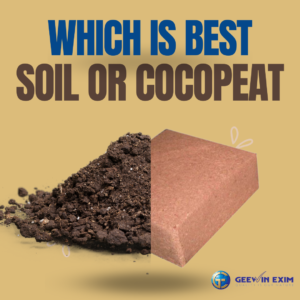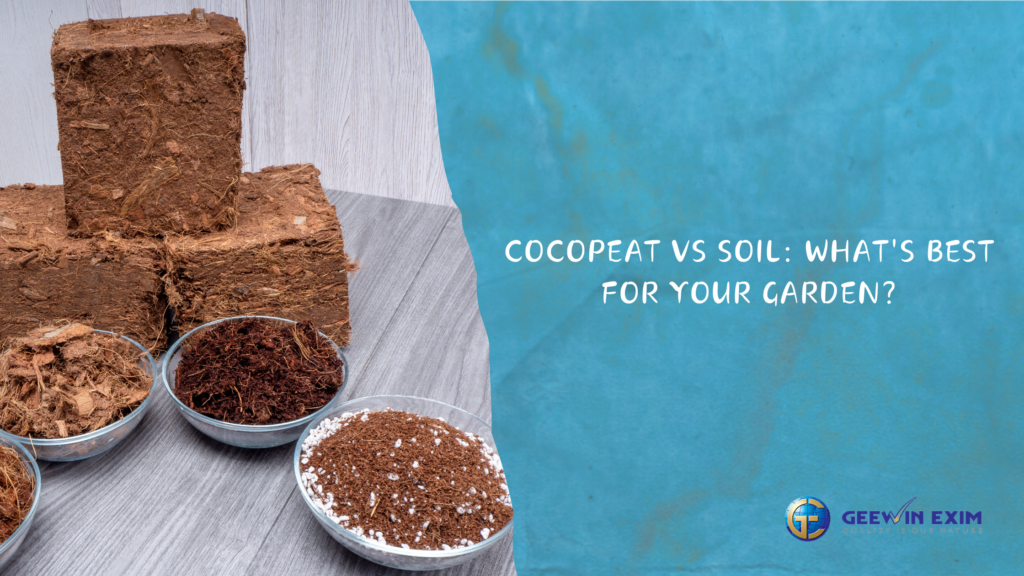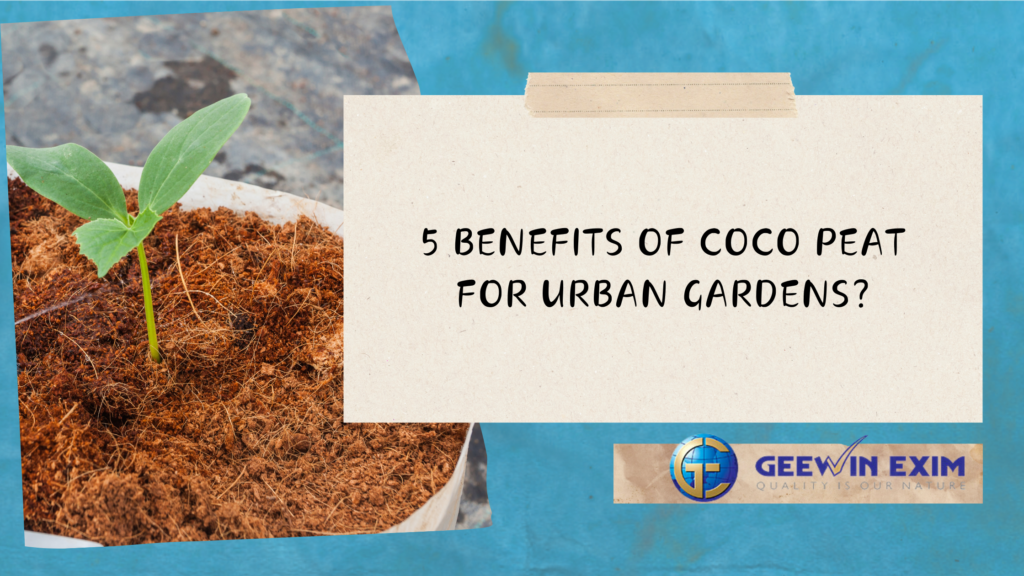Are you puzzled about selecting the growth medium for your garden?
If yes, put an end to your confusion as this blog is here to clarify.
Deciding between using coco peat blocks and traditional soil can be a confusing thing for gardeners as both options have their own strengths and weaknesses, and the best choice ultimately depends on the specific needs of your plants and your gardening preferences.
Traditional soil, a familiar favourite, offers a natural environment for plant growth and often contains essential nutrients, yet it can suffer from drainage issues, be inconsistent in quality, and potentially gives way to weeds or pests.
Cocopeat blocks, on the other hand, are an innovative and eco-friendly alternative made from coconut husks. These blocks boast exceptional water retention and drainage, promoting healthy root growth. Cocopeat has no nutrients and requires more monitoring compared to soil. Which is better for your garden? Let’s go through this blog to have better clarity.
What are the properties of Coco Peat Blocks?
Coco peat blocks, also known as coir pith blocks, are a versatile and sustainable growing medium derived from the husk of coconuts. These blocks exhibit several key properties that make them highly desirable for horticultural and agricultural applications.
Primarily, coco peat blocks are celebrated for their excellent water retention capacity, which can be attributed to the sponge-like structure of the coir fibres. This allows the blocks to hold moisture up to 10 times their weight, ensuring a consistent supply of water to plants and reducing the frequency of irrigation.
Additionally, coco peat has good aeration properties, preventing soil compaction and promoting healthy root growth by providing ample oxygenation and also their high cation exchange capacity (CEC), which improves the nutrient-holding ability of the medium. This means that coco peat can retain essential nutrients and release them slowly, providing a steady supply to plants.
Coco peat blocks are also pH neutral to slightly acidic, typically ranging from 5.5 to 6.5, making them suitable for a wide range of plants. They are free from harmful pathogens and weed seeds, ensuring a clean growing environment. Furthermore, coco peat is an eco-friendly and renewable resource, as it is a byproduct of the coconut industry, making it a sustainable alternative to peat moss. These properties collectively make coco peat blocks an ideal choice for improving soil health, improving plant growth, and promoting sustainable gardening practices.
What are the Properties of Traditional Soil?
Traditional soil, often referred to as natural or native soil, possesses a variety of properties vital for supporting plant growth and maintaining ecological balance. Composed of a mixture of organic matter, minerals, gases, liquids, and countless organisms, traditional soil is characterized by its texture, structure, and fertility. Soil texture depends on the proportion of sand, silt, and clay particles, influencing water retention, drainage, and root penetration.
A well-structured soil contains certain particles that improve aeration and water infiltration, supporting healthy root systems. Fertility is driven by the presence of essential nutrients like nitrogen, phosphorus, and potassium, along with beneficial microorganisms that aid in nutrient cycling and organic matter decomposition.
The pH level of traditional soil can vary, affecting nutrient availability and microbial activity. Additionally, soil organic matter improves soil structure, water-holding capacity, and nutrient supply. Traditional soil also plays a vital role in carbon sequestration and acts as a filter for pollutants, contributing to environmental health. Understanding these properties is fundamental for effective soil management and sustainable agricultural practices.
Also Read – Top 5 Benefits of Switching to Coco Peat for Urban Gardening
Cocopeats stand one step ahead of Traditional Soils: How?
Cocopeat, also known as coir pith or coconut coir, offers several advantages over traditional soil, making it a superior growing medium in various agricultural and horticultural applications. Derived from the husk of coconuts, cocopeat is an eco-friendly and sustainable alternative that addresses many limitations of traditional soil.
1. Excellent Water Retention Capacity
Cocopeat has excellent water retention capabilities. It can retain water up to 10 times its weight, ensuring consistent moisture availability for plants. This property reduces the frequency of irrigation, making it ideal for regions with water scarcity and for growing systems that require efficient water use, such as hydroponics and container gardening.
2. Superior Aeration and Drainage
Cocopeat provides superior aeration and drainage. Its fibrous structure allows for optimal air circulation around plant roots, preventing waterlogging and promoting healthy root development. This contrasts with traditional soil, which can become compacted and poorly drained, leading to root rot and other plant health issues.
3. Get Rid of Plant Diseases
Moreover, cocopeat is a sterile medium, free from harmful pathogens, weed seeds, and pests commonly found in traditional soil. This sterility minimizes the risk of plant diseases and reduces the need for chemical pesticides and herbicides, fostering a healthier and more organic growing environment.
4. Balanced pH level
Cocopeat also offers a balanced pH level, typically ranging from 5.5 to 6.5, which is suitable for most plants. This neutral pH reduces the need for frequent soil amendments to correct acidity and, simplify plant care as they are highly sustainable. It is a byproduct of the coconut industry, making it an environmentally friendly option that recycles waste materials.
5. Modern Agricultural Practices in Coco Peat
Cocopeat stands one step ahead of traditional soil due to its superior water retention, aeration, sterility, balanced pH, sustainability, and ease of handling. These properties make it an excellent choice for modern agricultural practices aimed at efficiency and sustainability.
Among Cocopeats and Traditional Soil, Which is Better for Your Garden?

Choosing between cocopeat and traditional soil for your garden depends on specific needs and conditions. Cocopeat surpasses the traditional soil in water retention, and aeration, and is free from pathogens, making it ideal for container gardening, hydroponics, and regions with water scarcity. Its neutral pH and lightweight nature also make your plant care and handling in a simple way.
On the other hand, traditional soil offers natural nutrients and beneficial microorganisms essential for plant health. It supports a diverse ecosystem, which can improve plant growth and soil fertility over time. However, traditional soil may require amendments for optimal pH and drainage and can be prone to compaction and disease. There are various cocopeat suppliers in India, so you can choose your preferable cocopeats for your plant’s growth.
Conclusion
For the best and healthy results for the plants, many gardeners use a mix of both: combining cocopeat with traditional soil can provide a balanced medium that leverages the benefits of both, ensuring health and reliable plant growth and a healthy garden ecosystem that makes your plants grow healthier. The cocopeats are also being exported with the same quality through various leading Coco Peat Exporters in India.
For the best quality coco peat that will enhance your plant’s health, Geewin Exim Pvt Ltd stands out as the prime choice. Our dedicated coconut groove ensures that our products maintain their finest quality. With a team of highly skilled professionals, we meticulously pack and process the cocopeats using the proper methods, leaving no room for compromises in quality. Our prompt delivery ensures that the coco peat reaches our valued customers in a timely manner, making our position as the leading coco peat supplier in India.








